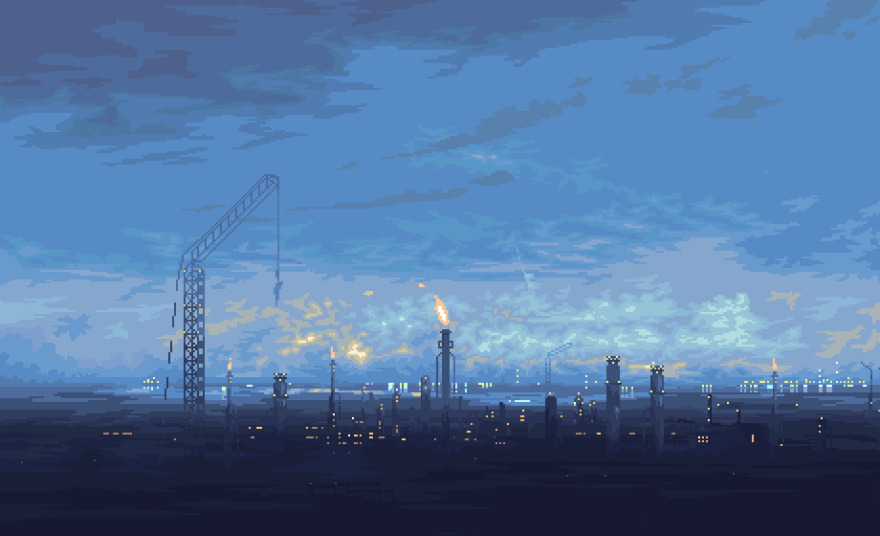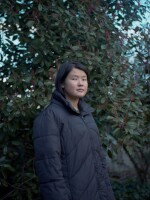NORCO, a Southern Gothic point-and-click game, has helped put Louisiana on the map – at least in the video game world. Named after Norco, Louisiana,the game was produced by Geography of Robots, a game development collaborative with the mission of exploring hidden geographies, conspiracies, folklore, and environmental histories of the American South through games and other experiments.
The game’s plot revolves around Kay, a young woman who returns to Norco after her mother dies from cancer and kicks off a plot to find her missing brother with equal amounts of southern charm and bizarre.
NORCO has has received rave reviews from Vulture, Kotaku, PC Gamer with the latter saying the game belongs “unequivocally in the highest tier of narrative experiences in the medium today.” Last year, the game won the first ever Tribeca Games Award.
WWNO is joined by NORCO creator Yuts, a Norco, Louisiana native currently based in Virginia. Yuts, as he is known in the gaming industry, uses his pseudonym for public facing endeavors.
This interview has been edited and condensed for clarity.
For those unfamiliar, how would you describe NORCO?
Yuts: It's a point and click adventure game that is maybe a little unconventional. In certain ways, it might feel more like an experimental piece of interactive media.
It's meant primarily to explore the landscapes of Greater New Orleans, the cypress swamps and Lake Pontchartrain, the Mississippi River, the western suburbs of New Orleans, Kenner, Metairie, River Parishes, etc. But it does so through a narrative that follows a young woman named Kay, who has returned to Norco after several years of hitchhiking across the United States.
And she comes home because her mother has recently died of cancer. The game alternates between Kay's timeline and her mom's timeline, in the weeks before her death and you're slowly assembling a picture of what happens in those weeks leading up to her death that has caused your brother to go missing. And that's the mystery that's in the center of the game.
What is Kay’s role for the player?
The way she's depicted in the game is that her face is almost an expressionless, neutral face emoji. And she's in some ways meant to be simply a vacuum for the player to inhabit.
There are some suggestions that she has preferences, that she has opinions. that she has a past but during the interval where the player inhabits her she becomes very detached and passive.
For you, how did this game come about?
I grew up in Norco. And I've always been really fascinated by the industrial landscapes in the river parishes. Me and a friend, in the years after Katrina, started a kind of small, informal oral history project that explored the river parish region, industrialization, post Katrina, flooding, etc.
It was kind of a mixed media project. We would take photographs, paint things, write things. And one of the pieces of output from that project was a small side scrolling video game that followed a security android named Million who was attempting to infiltrate the “Shield Oil Refinery” that was based on the Shell Oil Refinery in Norco.
I wrote that in JavaScript probably about five or six years ago, and that became the foundational code base for Norco.
How do you hope this game will speak to local listeners and listeners who see Norco as home reflected in this game? What did you intend for it to say to a Louisiana audience?
I love Norco. And I love the river parish region. And despites the wood a lot of people call the dystopian qualities that the game has, it’s actually very much a love letter to the river parishes.
It's a region that I adore, I think it's beautiful. And the game tries to express honestly, the kind of conflicting emotions that you have living in a place that in many ways is participating in its own degradation.
And so that's what it is. It's a complicated love letter. And I hope that locals will recognize those sentiments as well.
More than a handful of people have reached out and expressed how much it means to them that they see some of their own personal experiences reflected in the game. I've also heard from current and former Norco residents who've expressed similar sentiments.

The game for one thing is not for everyone - there's a lot of reading, it's a very dense game. It doesn't aspire to resolve or give any kind of easy resolution to the narrative. It's meant only to explore these kinds of emotional and physical landscapes in the game. So I don't think everyone's gonna love it.
It also may depict certain environments in ways that people find disagreeable. But I do hope that it resonates with enough people who are familiar with the region that they feel overall it was an honest effort to depict the region accurately.
Why is it so important to explore a place like Norco and all its flaws and nuances? There was an in-game example brought up with authenticity and a conversation with the movie director filming in town.
Authenticity is such a contested thing in Louisiana. And I think nativism is almost like this rare resource where transplants will sort of argue over who gets to claim the title of native, you know, if they've been here since before Katrina, things like that. It's such a rich and contested concept.
It’s also mined and extracted by media industries. And so the interaction that you have with the movie directors is a little bit of an investigation into that phenomenon of people who know that Louisiana is very culturally rich and are looking to extract and make a profit from that resource.
So the film director does so indelicately, and trying to badger authentic local dialogue out of Kay.
What feedback has stuck out to you and the collaborative the most?
We've heard from people who have lost family members to cancer, people who are currently caring for family members suffering from illness.
We've heard from people who live on the other side of the world who are thrilled that they can learn something about Louisiana or people who are fascinated by Louisiana and feel like this is a depiction that is resonant, that feels real.
Could you expand on autofiction and what purpose that serves in NORCO?
The narrative in many ways was almost a stream of consciousness. There were certain dimensions of it that were constructed collaboratively. Me and Aaron Gray and Jesse Jacobi, Gewgawly I, fmAura - the other members of the collaborative are on a discord together along with several other collaborators and friends.
In writing the narrative, I would often share elements, and we would workshop them, think through them. A lot of what was occurring in our digital media environments during the COVID lockdown would find their way into the narrative and so it became a communal storytelling enterprise.
A lot of the COVID experience seeped into the game, which I think is for the better. I think the game became on top of everything else, a time capsule for communicating the anxieties of the age that we're living through.
Sound and music have been one of the things that really stuck out to me when playing through, I was thinking “Oh, I'm in my South Louisiana home, listening to music that sounds like South Louisiana. ” Could you talk to me about that process?
When this whole thing started, it was just me and Gewgawly I, the composer. We were both living in New Orleans. And I know Gewgawly I had some intention of trying to capture the general mood and ambience of the region.
And then that became a more elevated process when fmAura joined. A friend of ours, Matt Carney who also helped to edit the game is from Baton Rouge. He did some field recordings in his parents backyard in Baton Rouge and near the chime tree and city park and other other locations and sent those to fmAura. A lot of those got incorporated into the game. So there are some field recordings featured in the game as well.
Lots of consideration and work went into the sound design of the game.

For fun questions and spoiler full answers, don’t read below unless you don’t mind being spoiled! You have been warned -
Favorite public unlockable gaming achievement?
Class traitor.
On Lucky, Pawpaw and incorporation of the old Southern white man archetype -
There are people in my life who are some permutations of all of those men, and have been throughout my life strong role models and things like that. It was important that they be represented in the game.
On exploding cats and other mini phone case adventures -
I guess that is something that should be important to mention is that the game is, in many ways, disturbing and grotesque.
And for that reason alone is not meant for everyone and there's a content warning right at the start that it does feature depictions of suicide. There's also some very crude characters that you interact with.
The world that it depicts is one of deep emotional trauma and climate instability. And you see the ways in which these things distort the personalities of people. And that uneasiness is threaded all throughout the game.
Near the end of the game, the player as Kay - recounts the house fading away and it touches on the idea of power in memory and what happens when that fades away-
That's exactly the message that's intended - the deterioration in the alienation of a communal history. The family is divided, that the mom’s illness can be blamed, largely on industry, that the alienation of her brother is one that's rooted in the type of alienation that we experience as being hyper online emotionally detached individuals, and that there's a loss of communal loss of history and culture, and that the family is by the end of the game entirely erased.
There's a segment that you can optionally read right at the beginning that tells the future of the house.
The house is eventually squatted, and razed to the grounds after the Mississippi River changes course and Norco is abandoned. And so that all of these, these familial and cultural threads are lost to time and disintegrated as technological acceleration continues.
A take on making the mundane have a new form from the closed sno-ball stand to the techno statue of Mary outside the house -
I think the mundane and the domestic are extremely important in the game, that there are these physical and interior domestic spaces where these family familial and cultural resources are at least somewhat preserved inside of these domestic spaces. And that's how the dissolution of the house is symbolic in that way.
Any last thoughts?
So many people have helped, so many people have shown support. Our publisher has been extremely supportive. So all of us in the collaborative are extremely, extremely grateful.



